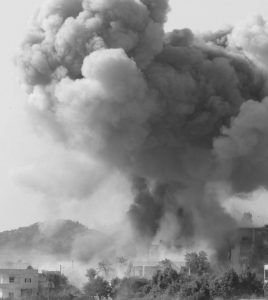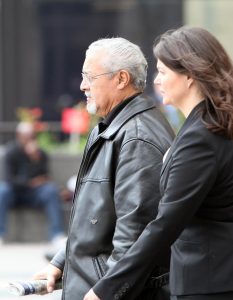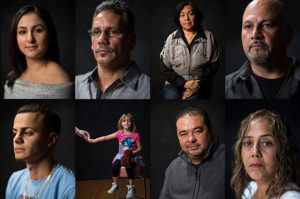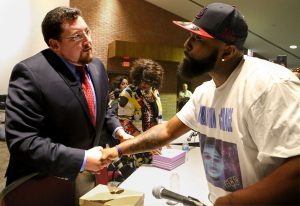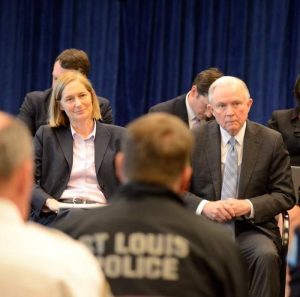Podcast: Play in new window | Download
Update:
—-
US Bombs Syria
Donald Trump made two important promises during his presidential campaign: he vowed to not get involved in the Syrian Civil War where jihadist groups have been trying to overthrow the government of Assad for six years and the second promise he made during his campaign was to better relations with Russia which is a supporter of Assad and a strategic ally. Syria borders Russia to the south and has a warm water Mediterranean port.
Both these promises were broken on April 4, 2017 when President Trump illegally ordered the bombing by 54 Tomahawk missiles of the Shayrat Air Base in eastern Syria. The missile strike violated the United Nations charter, the convention against the use of chemical warfare, and United States law called the War Powers Act, not to mention Article 2 of the US Constitution. In support of his unilateral decision to bomb a sovereign nation with whom the United States is not at war, President Trump claimed that he was motivated by learning of the horrible death of several children in the farm village of Khan Shaykhun. The children died of an alleged poison gas attack which Trump claimed was carried out by the Assad government, which denies the charge. Without an impartial objective investigation required by The Chemical Weapons Convention,without going to the United Nations Security Council, and without any evidence, President Trump claimed that sarin, a poisonous nerve gas, was used by the Assad government.
Trump’s former critics who sprung to his defense included Hillary Clinton, Senate Minority Leader Democrat Chuck Schumer, and Republican leaders John McCain and Lindsey Graham, the entire mass media including the New York Times, Washington Post, MSNBC, and CNN. Television reporter Brian Wilson use the word “beautiful” three times to describe the tomahawk missile explosions. Why did Trump reversed his position of not getting involved in the Syrian civil war? Why did he all the sudden take on Russia, to whom he had pledged better relations?
Guest – Phyllis Bennis directs the New Internationalism Project at IPS, working as a writer, activist and analyst on Middle East and UN issues. She is also a fellow of the Transnational Institute in Amsterdam. In 2001 she helped found and remains active with the U.S. Campaign to End the Israeli Occupation. She works with many anti-war organizations, and writes and speaks widely across the U.S. and around the world as part of the global peace movement. She has served as an informal adviser to several top UN officials on Middle East and UN democratization issues.
—-
A Chicago Cop is Accused of Framing 51 People For Murder
Fifty years ago the great comedian Lenny Bruce used to crack that “Chicago is so corrupt it’s thrilling.” It has become known as “the conviction capital of the USA.” Today retired Chicago detective is accused of framing at least 51 people for murder, most of them from Humboldt Park in Chicago, a working class predominately Puerto Rican neighborhood. He was on the force from the 1980s through the early 2000’s. Guevara’s alleged misconduct sent 48 men and one woman to be sentenced to a total of more than 2300 years in prison. Three were acquitted. Five received life sentences. Three were sentenced to death, but spared when in 2003 Governor George Ryan, disturbed by a rash of wrongful convictions, commuted all of the death sentences to life in prison or less. Two men died behind bars.The initial work in uncovering Guevara’s misconduct fell by default to a group of women, mostly working class mothers, aunts, and sisters with limited English and limited familiarity with the law.
As investigative reporter Melissa Segura has written in BuzzFeed, “armed with nothing more than dining room tables full of transcripts, police reports, and post it notes, marking the cracks in cases against their love ones, together they identified patterns running through Guevara’s cases.” They achieved some victories. They gave information to civil rights attorneys at the Loevy and Loevy Chicago law firm which helped free Juan Johnson who later went on to receive a record $21 million and a judgment against the city of Chicago because of Guevara’s misconduct. So far six men have had their convictions overturned, 12 others have been released, 29 say they were framed remade in prison. Detective Guevara’s Witnesses by Melissa Segura
Guest – Attorney Tara Thompson is the founder of the Exoneration Project at Loevy and Loevy. Following law school Tara worked as an associate in Mayer Brown’s Chicago office, where she represented clients in a variety of litigation matters, including a significant commitment to pro bono representation. She left Mayer Brown in 2006 to clerk for Judge Elaine Bucklo of the United States District Court for the Northern District of Illinois. After completing her clerkship, she joined Loevy & Loevy in 2007.
Guest – Attorney Anand Swaminathan, is litigating the civil damage cases arising from the work of Guevara’s frame ups and which have demonstrated a pattern and practice of police misconduct. Since joining the firm, Anand has worked on a broad range of constitutional and civil rights cases, including wrongful convictions, the denial of medical care to inmates and detainees in jails and prisons, and retaliation for exercising free speech rights. Anand also works extensively on False Claims Act litigation, in which he represents whistle-blowers alleging military and other government contractor fraud, Medicare and Medicaid fraud, construction/contractor (MBE/DBE) fraud, bid-rigging, and tax fraud. Anand also represents whistleblowers in financial fraud cases under the Dodd-Frank financial reform bill, and in complex fraud cases under other federal and state statutes.
—-
Carl Messineo Consent Decrees and Policing in the U.S.
During the Obama administration, the Justice Department has sought to reform police practices considered discriminatory by using a statutory tool little known by the public and even less well understood. So-called “consent decrees” were established after the Los Angeles Rodney King riots, and allow the Department’s Civil Rights Division to sue local police forces that have been found to have “a pattern and practice” of using excessive force or violating individuals’ rights.
The DOJ launches an investigation into a police department’s operations, frequently after a high-profile incident – such as the 2014 shootings of Michael Brown in Ferguson, MO, and Laquan McDonald in Chicago. If the feds find that the departments operate with an ongoing pattern of abuse, they sue, in essence forcing the law enforcement groups to settle the cases and undergo a change to their culture to a degree deemed sufficient by the court and the DOJ.
Some of the more recent agreements, like those with the Baltimore and Ferguson Police Departments, are better known to the public, but others are not and many haven’t yet seen a resolution. Out of 19 investigations carried out since 2010, six are considered “ongoing.”
Jeff Sessions said in 2008 that “One of the most dangerous, and rarely discussed, exercises of raw power is the issuance of expansive court decrees. Consent decrees have a profound effect on our legal system as they constitute an end run around the democratic process.” The new Attorney General has threatened to do away with them.
Guest – Attorney Carl Messineo, co-founder of The Partnership for Civil Justice Fund, a nonprofit progressive legal organization based in Washington DC. The organization focuses on cases regarding free speech and dissent, domestic spying and surveillance, police misconduct, government transparency, and educating the public about their rights. In the “Founders Message,” the organization states, “As we look to the future, the Partnership will continue to be at the forefront of legal struggle, using the law to defend and create room for the peoples’ movement for progressive social change.”
——————————————————
